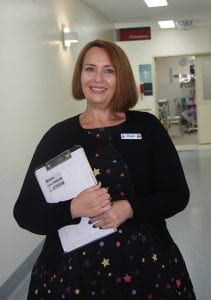New peer support model breaks down barriers
An innovative new model of care in The Prince Charles Hospital (TPCH) emergency department is providing vital support to people who present with severe mental health conditions.
The model uses peer workers with lived experiences of mental health challenges to work with consumers, their family and carers, providing an additional and unique level of support to those individuals experiencing a heightened mental state or crisis.

Advanced Peer Worker, Kelli Copelin
Director of TPCH’s Emergency Department, Dr Neil Grant said that emergency departments can be busy and overwhelming environments for people, but particularly when they are experiencing a mental health crisis.
“When a person is in mental distress, the prospect of coming to an emergency department can be traumatic for them and their family,” Dr Grant said.
“The unfamiliarity and business of this type of environment can sometimes challenge that individual to a point where they become more distressed, and in some cases overwhelmed”.
“This can make the delivery of best care very challenging for staff whose main focus at the time is to provide treatment to address the person’s most immediate medical needs.”
The peer worker works alongside emergency department and dedicated mental health staff to support the care process, so that consumers have an alternative, non-clinical point of contact to help guide and support them through their hospital visit.
The peer worker also provides the consumer, their family and carers with a wide range of options and referrals to explore after leaving the hospital which might build their capacity to seek supports and connections within their community.
Advanced Peer Worker, Kelli Copelin said: “When people present in a high level of distress, it is very difficult for them to absorb and comprehend what is happening to them.”
“The role of the peer worker is to help calm and normalise the experience as much as possible, so the consumer feels informed, comfortable and more at ease about their care,” Kelli said.
“The support I provide depends on the individual. This can be as simple as sitting with consumers and talking to them about their own situation and sometimes sharing to my own experiences to help relate and connect.
“Explaining what to expect during and after their hospital visit can ease their anxiety during the often unknown assessment process.
“A simple chat, offering a cuppa and a sandwich or providing distraction options such as colouring in or a book can help take their mind off what is happening around them.
“I sometimes introduce concepts around personal recovery and hope through informing or providing printed materials about recovery plans, sleep hygiene, mindfulness, distraction techniques and exploring various apps and online resources.”
Kelli said that having a lived experience of mental illness is central to the success of the role.
“Knowing I have a lived experience can instantly break down the barriers and create a level of empathy and trust,” Kelli said.
“This connection is essential when caring for an individual in a sensitive mental state, as it allows them to become less anxious, open up, and instils some hope for their recovery.”
Since the peer worker model was introduced in July 2019, it has received positive feedback from consumers, families, and staff.
Dr Neil Grant said the role has proved effective in helping to support many complex situations involving patients requiring emergency support for significant mental health concerns.
“The model provides patients with a different avenue to receive the emotional and mental support they need, which in turn, makes the process of clinical care delivery much more manageable,” Dr Grant said.
“It gives an opportunity to focus on the personal as well as the clinical aspect of care.”
QUALITY OF CARE
TABLE OF CONTENTS
